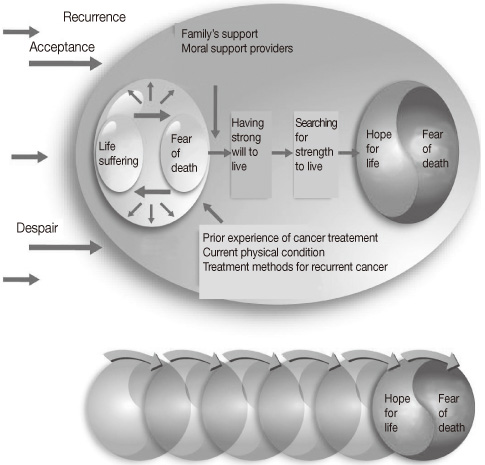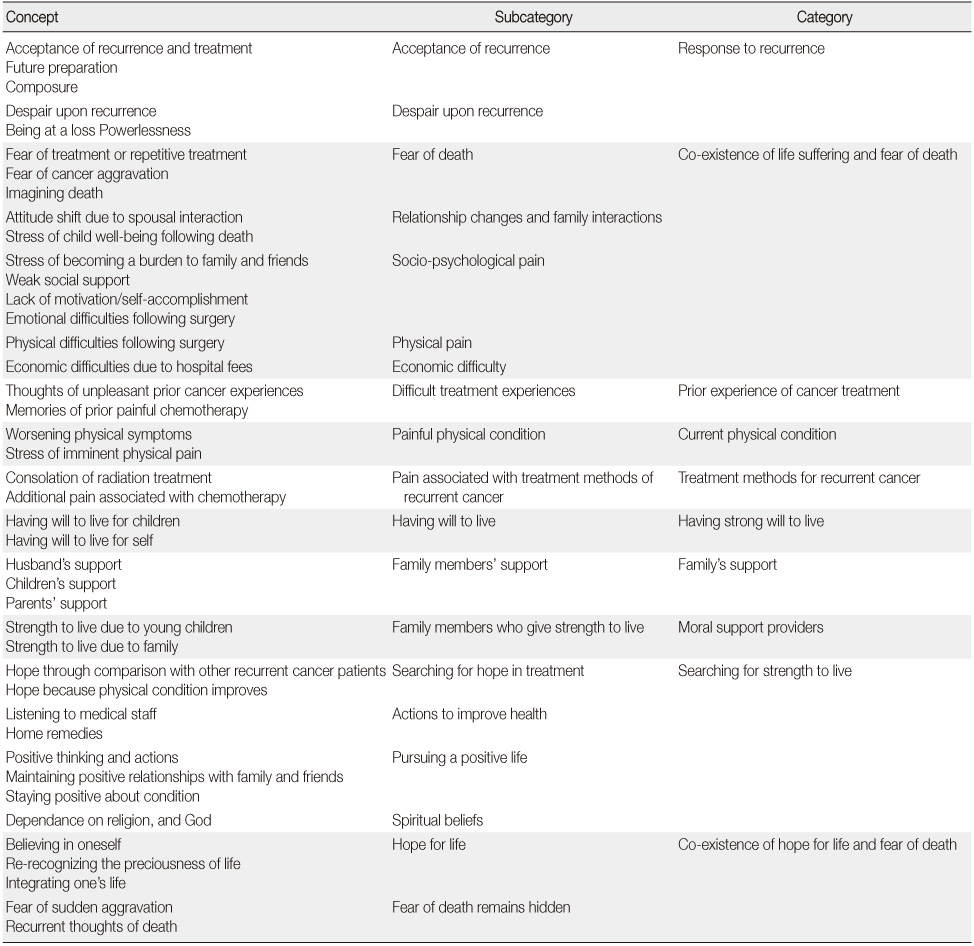Articles
- Page Path
- HOME > J Korean Acad Nurs > Volume 41(2); 2011 > Article
-
Original Article
- Life Experience of Inpatients with Recurrent Breast Cancer
- Young Ju Kim
-
Journal of Korean Academy of Nursing 2011;41(2):214-224.
DOI: https://doi.org/10.4040/jkan.2011.41.2.214
Published online: April 30, 2011
Full-time Lecturer, Department of Nursing, Daejeon Health Sciences College, Daejeon, Korea.
- Address reprint requests to: Kim, Young Ju. Department of Nursing, Daejeon Health Sciences College, 77-3 Gayang 2-dong, Dong-gu, Daejeon 300-711, Korea. Tel: +82-42-670-9378, Fax: +82-42-670-9370, yjkim@hit.ac.kr
• Received: January 8, 2010 • Accepted: April 15, 2011
© 2011 Korean Society of Nursing Science
Abstract
-
Purpose
- Understanding daily life experiences of patients admitted to hospital with recurrent breast cancer.
-
Methods
- The grounded theory method was used for this study.
-
Results
- Consistent comparative analysis was used throughout the study to obtain the results. Results showed that inpatients with recurrent breast cancer experience 'a co-existence of life suffering and fear of death'. The causal condition of this result was determined to be 'patient's response to cancer recurrence (acceptance/despair)', including contextual conditions such as, 'previous experience with cancer treatment', 'patient's current physical condition', and 'treatment methods for recurrent cancer'. Intervening conditions, such as 'a strong will to live', 'family support', 'moral support providers', and action/interaction strategies were found to provide patients with 'a strength to live'. Shown in these results, inpatients with recurrent breast cancer were seen to have a simultaneous 'hope for life and fear of death'.
-
Conclusion
- When providing nursing services to inpatients with recurrent breast cancer, people must recognize there is a notable difference between individual patients' contextual conditions and interactive strategies. Henceforth, proper cognitive nursing must be provided which encourages patients to maintain a strong will to overcome the many hardships of treatment as well as physical nursing, such as management of side effects caused by chemotherapy.
- 1. Bull AA, Meyerowitz BE, Hart S, Mosconi P, Apolone G, Liberati A. Quality of life in women with recurrent breast cancer. Breast Cancer Research and Treatment. 1999;54:47–57.Article
- 2. Cho OH, Yoo YS. Psychosocial adjustment, marital intimacy and family support of post-mastectomy patients. Journal of Korean Oncology Nursing. 2009;9:129–135.
- 3. Guba EG, Lincoln YS. Effective evaluation. 1981;San Francisco, CA, Jossey-Bass.
- 4. Hofstede G. Culture's consequences: International differences in work-related values. 1980;Beverly Hills, CA, Sage.
- 5. Hofstede G. Cultural differences in teaching and learning. International Journal of Intercultural Relations. 1986;10:301–320.Article
- 6. Im EO. Development of situation-specific theories: An integrative approach. Advances in Nursing Science. 2005;28:137–151.ArticlePubMed
- 7. Im EO. A situation-specific theory of Caucasian cancer patients pain experience. Advances in Nursing Science. 2006;29:232–244.Article
- 8. Jeon MH. (An) Experience of life following breast cancer surgery. 1994;Seoul, Seoul National University. Unpublished Doctoral dissertation.
- 9. Jo KH, Son BK. The relationship of uncertainty, hope and quality of life in patient of breast cancer. Journal of Korean Academy of Nursing. 2004;34:1184–1193.PubMed
- 10. Johnson-Vickberg SM. Fears about breast cancer recurrence. Cancer Practice. 2001;9:237–243.ArticlePubMedPDF
- 11. Jung PJ, Im TH. The patterns, the survival, and the change of serologic markers after recurrence in patients with breast cancer. Journal of the Korean Surgical Society. 1998;54:313–322.
- 12. Kenne-Sarenmalm E, Thorén-Jönsson AL, Gaston-Johansson F, Öhlén J. Making sense of living under the shadow of death: Adjusting to a recurrent breast cancer illness. Qualitative Health Research. 2009;19:1116–1130.ArticlePubMedPDF
- 13. Kim BH, Tak YR, Chon MY. A study of the experience of patients with terminal cancer who are in an independent hospice center. The Journal of Nurses Academic Society. 1996;26:668–677.ArticlePDF
- 14. Kim JY, Chang ES. The recurrence of breast cancer after the breast conservation surgery. Journal of the Korean Cancer Association. 1994;26:415–424.
- 15. Kim KB. A study on the attitudes toward death of the elderly people. The Journal of Nurses Academic Society. 1978;8:85–98.ArticlePDF
- 16. Kim SI, Park BW. The impact of patient age upon locoregional and systemic failures after breast conservation therapy. Journal of the Korean Surgical Society. 2001;60:23–28.
- 17. Mahon SM, Cella DF, Donovan MI. Psychosocial adjustment to recurrent cancer. Oncology Nursing Forum. 1990;17(3):47–52.PubMed
- 18. Maliski SL. The experience of recurrent breast cancer: A case study. 1997;Chapel Hill, USA, State University of North Carolina. Unpublished doctoral dissertation.
- 19. Meleis AI. Theoretical nursing: Development & progress. 2007;4th Ed.Philadelphia, PA, Lippincott Williams & Wilkins.
- 20. Min HS, Park SY, Lim JS, Park MO, Won HJ, Kim JI. A study on behaviors for preventing recurrence and quality of life in breast cancer survivors. Journal of Korean Academy of Nursing. 2008;38:187–194.ArticlePubMed
- 21. Montagna E, Bagnardi V, Rotmensz N, Rodriguez J, Veronesi P, Luini A. Factors that predict early treatment failure for patients with locally advanced (T4) breast cancer. British Journal of Cancer. 2008;98:1745–1752.ArticlePubMedPMCPDF
- 22. National Cancer Information Center. Breast cancer statistics. 2009;05 27 Retrieved January 6, 2010. from http://www.cancer.go.kr/cms/cancer/cancer_is/04/1191178_1753.html.
- 23. National Cancer Information Center. Breast cancer statistics. 2010;01 13 Retrieved January 6, 2010. from http://www.cancer.go.kr/cms/statics/stat/1372851_1611.html.
- 24. No OH. Breast cancer survivor's conquest experience. 2003;Gwangju, Chonnam National University. Unpublished Doctoral dissertation.
- 25. Northouse LL, Dorris G, Charron-Moore C. Factors affecting couples' adjustment to recurrent breast cancer. Social Science & Medicine. 1995;41:69–76.Article
- 26. Santillan AA, Kiluk JV, Cox JM, Meade TL, Allred N, Ramos D. Outcomes of locoregional recurrence after surgical chest wall resection and reconstruction for breast cancer. Annals of Surgical Oncology. 2008;15:1322–1329.ArticlePubMedPDF
- 27. Shin KR. A phenomenological perspective and discovery of meaning in mid-aged womenoasiss experience of mastectomy. The Journal of Nurses Academic Society. 1995;25:295–315.
- 28. Strauss A, Corbin J. Basics of qualitative research: Techniques and procedures for developing grounded theory. 1998;California, CA, Sage Publication Inc.
- 29. Suh YO. Predictors of quality of life in women with breast cancer. Journal of Korean Academy of Nursing. 2007;37:459–466.ArticlePubMedPDF
REFERENCES
Figure & Data
REFERENCES
Citations
Citations to this article as recorded by 

- Post-traumatic Growth Experiences of Breast Cancer Survivors: A Grounded Theory Approach
Seung-Kyoung Yang, Young-Suk Park, Eun-Joo Lee
Journal of Korean Association for Qualitative Research.2024; 9(2): 79. CrossRef - Journey through the Fight against Ovarian Cancer: Finding the Existence Value with being Tied to the Bridle of Death
Young-Suk Park, Jeong Sook Park
Korean Journal of Adult Nursing.2018; 30(6): 656. CrossRef - The Illness Adaptation Process of Patients Suffering from Myelodysplastic Syndrome (MDS): Doing My Best in Uncertainty
Ae-Kyung Kim
Korean Journal of Adult Nursing.2017; 29(5): 472. CrossRef - Decision-making process related to treatment and management in Korean women with breast cancer: Finding the right individualized healthcare trajectory
Kkotbong Kim, Jinhyang Yang
Applied Nursing Research.2017; 35: 99. CrossRef - The Experience of Illness in Non-Hodgkin Lymphoma Patients
Hye Sook Kim, Myungsun Yi
Asian Oncology Nursing.2016; 16(3): 121. CrossRef - A comparison of the effectiveness of complex decongestive physiotherapy and stellate ganglion block with triamcinolone administration in breast cancer-related lymphedema patients
Jeong-Gil Kim, Soon Ook Bae, Kwan Sik Seo
Supportive Care in Cancer.2015; 23(8): 2305. CrossRef - An Ethnographic Research on Psychological Experiences of Mothers Caring for their Children with Recurent Cancer
Seong-Heui Kim
Asian Oncology Nursing.2015; 15(2): 75. CrossRef
Life Experience of Inpatients with Recurrent Breast Cancer

Figure 1
Life process of inpatients with recurrent breast cancer.
Figure 1
Life Experience of Inpatients with Recurrent Breast Cancer
Concepts, Subcategories and Categories
Table 1
Concepts, Subcategories and Categories
 KSNS
KSNS
 E-SUBMISSION
E-SUBMISSION


 Cite
Cite

